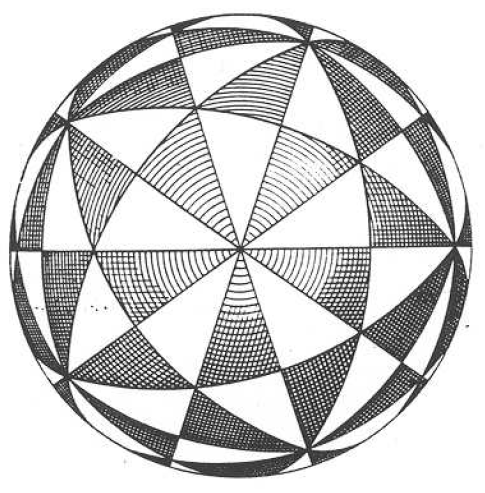Problem - P. Bracken (USA)
Prove
\[\int_0^1\frac{\ln(1+x)\ln(1-x)}{x}\,\mathrm dx=-\frac{5\zeta(3)}{8}.\]Solution
Call the posed integral $I$ and define
\[J=\int_0^1\frac{1}{x}\ln^2\left(\frac{1-x}{1+x}\right)\,\mathrm dx.\]Upon making the substitution $x=\frac{1-t}{1+t}$ we find that
\[\begin{align*} J &= 2\int_0^1\frac{1+t}{1-t}\cdot\frac{1}{(1+t)^2}\ln^2(t)\,\mathrm dt \\ &= 2\int_0^1\frac{\ln^2(t)}{1-t^2}\,\mathrm dt \\ &= 2\int_0^1\ln^2(t)\sum_{n=0}^\infty t^{2n} dt, \\ &\qquad\text{by monotone convergence} \\ &= 2\sum_{n=0}^\infty\int_0^1\ln^2(t)t^{2n}\,\mathrm dt \\ &= 4\sum_{n=0}^\infty\frac{1}{(2n+1)^3} \\ &= \frac{7\zeta(3)}{2}.\end{align*}\]In the above, the integral $\int_0^1\ln^2(t)t^\alpha\,\mathrm dt$ may be evaluated by differentiating $\int_0^1 t^\alpha\,\mathrm dt=\frac{1}{\alpha+1}$ under the integral sign twice. And the sum $\sum_{n=0}^\infty\frac{1}{(2n+1)^3}$ can be evaluated by considering $\sum_{n=1}^\infty\frac{1}{n^3}=\sum_{n=0}^\infty\frac{1}{(2n+1)^3}+\sum_{n=1}^\infty\frac{1}{(2n)^3}$.
Let
\[K=\int_0^1\frac{\ln^2(1-x^2)}{x}\,\mathrm dx.\]If we make the change of variables $x=\sqrt{1-t}$ so that $\mathrm dx=\frac{-1}{2\sqrt{1-t}}\,\mathrm dt$ we get
\[\begin{align*} K &= \frac{1}{2}\int_0^1\frac{\ln^2(t)}{1-t}\,\mathrm dt \\ &= \frac{1}{2}\int_0^1\ln^2(t)\sum_{n=0}^\infty t^n\,\mathrm dt, \\ &\qquad\text{by monotone convergence}\\ &= \sum_{n=0}^\infty\frac{1}{(n+1)^3} \\ &= \zeta(3).\end{align*}\]Then
\[\begin{align*} I &= \frac{1}{4}\int_0^1\frac{(\ln(1-x)+\ln(1+x))^2-(\ln(1-x)-\ln(1+x))^2}{x}\,\mathrm dx \\ &= \frac{1}{4}\left(\int_0^1\frac{(\ln(1-x)+\ln(1+x))^2}{x}\,\mathrm dx-\int_0^1\frac{(\ln(1-x)-\ln(1+x))^2}{x}\,\mathrm dx\right) \\ &= \frac{1}{4}(K-J) \\ &= -\frac{5\zeta(3)}{8}.\end{align*}\]